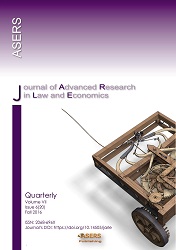International Legal Aspects of the Environment Protection in Modern Conditions
International Legal Aspects of the Environment Protection in Modern Conditions
Author(s): Zhuldyz Baimuratkyzy Umbetbayeva, Ualikhan Akypbekovitch Akhatov, Bakhytzhan Zhursunovitch Kuandykov, Madiyar Nurdavletovitch Umbetov, Nursultan Bakytbekovitch KalkashevSubject(s): Energy and Environmental Studies, International Law
Published by: ASERS Publishing
Keywords: ecology; management; law; structure; development; determination; the ability; cooperation;
Summary/Abstract: The international legal system, the basis of every international law are specific guidelines to the industry. As a ‘support structure’ of each industry are the basic principles of international law, but each branch of international law, and has its branch principles. The need for comprehensive application of the rules of international environmental and international economic law specifies the relationship and interaction of the special principles of these two branches of international law, which are considered in this section of the dissertation research.The appearance of the principles of international law ‘gave international law a completely new quality -right forces has given way to the force of law.’ In the science of international law, there are several approaches to the classification of the principles of international law. Russian science has traditionally allocates the basic (common) principles of international law and the specific principles of international law. Today, the development of the principles of international law affect global problems, most of which have economic and environmental dimension.Nature is not a free application to the economy; it has its own value. Final Act of the CSCE in 1975, provides that States Parties undertake to promote the progressive development, codification and implementation of international law as a means of preservation and improvement of the human environment, including principles and practices that have been adopted by them with regard to combating pollution and other damage to the the environment, arising from activities undertaken within their jurisdiction or control and influence other countries and areas. The principles complement each other, and the application of the principle of due to the use of others. The content of the universally recognized principles of international law is specified in the specific principles of the relevant branches of international law. Since general international law, in addition to the principles underlying its entire system of norms, includes such principles are based on the first, form the basis of the relevant international law sector. It should be noted that the system of special principles of international environmental law is in the making. International instruments contain various lists of principles of international environmental law, the same can be said about the international legal doctrine. In particular, many States have recognized principles of international environmental law legally binding. The principles of international environmental law are reflected in international treaties, acts of international organizations, State practice and rules of soft law ... is potentially applicable to all members of the international community.Keywords: ecology, management, law, structure, development, determination, the ability, cooperation.
Journal: Journal of Advanced Research in Law and Economics (JARLE)
- Issue Year: VII/2016
- Issue No: 20
- Page Range: 1528-1538
- Page Count: 11
- Language: English
- Content File-PDF

